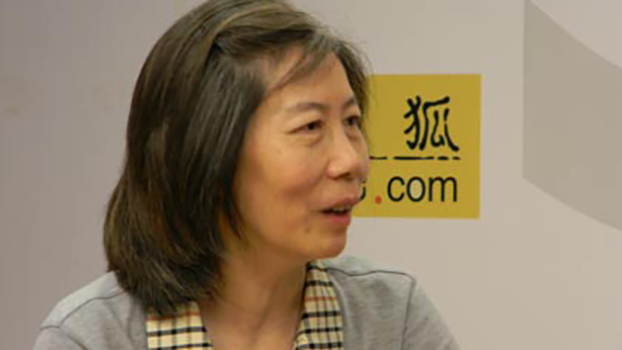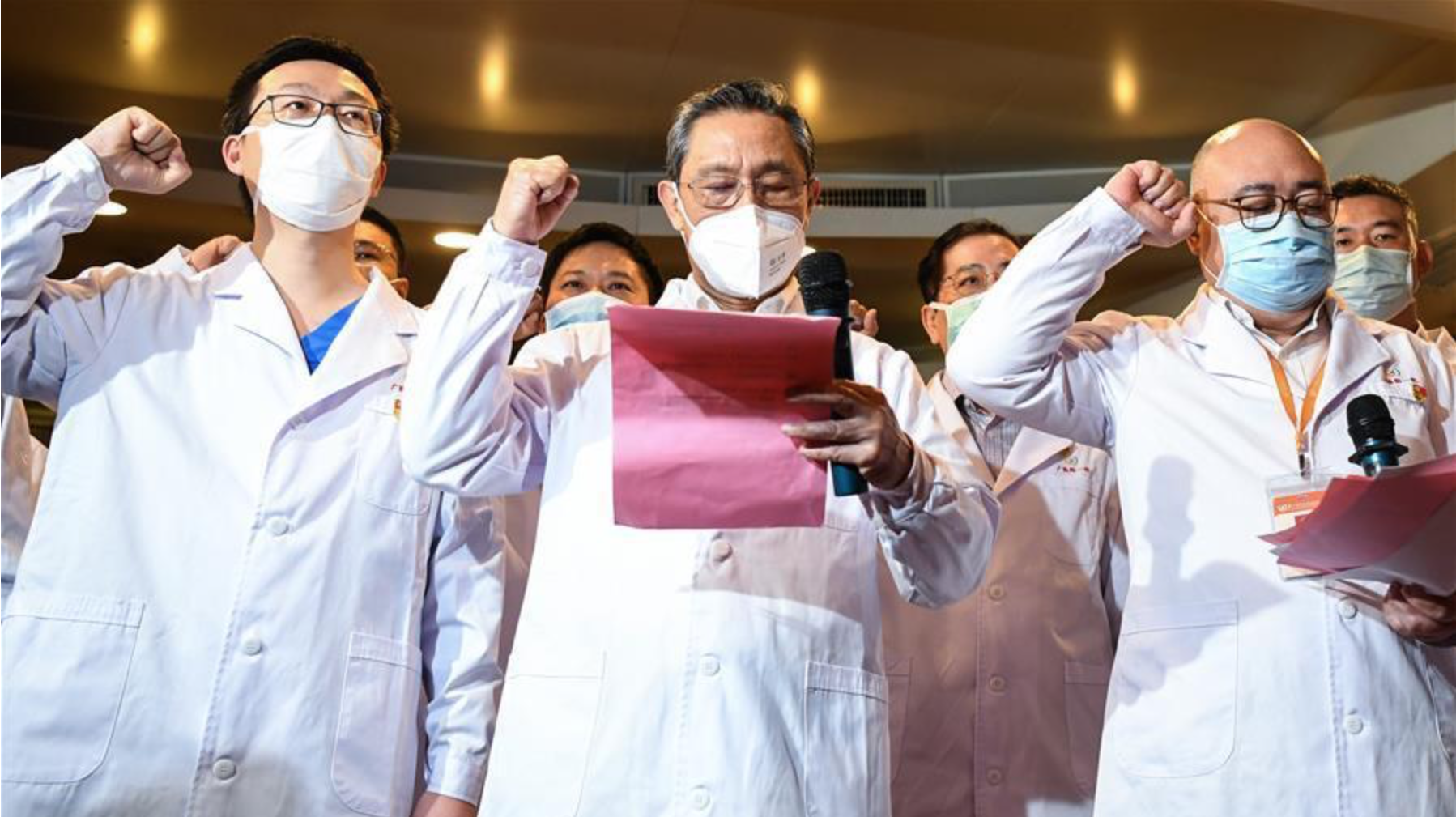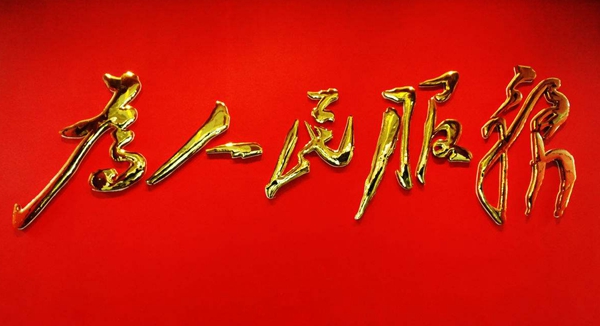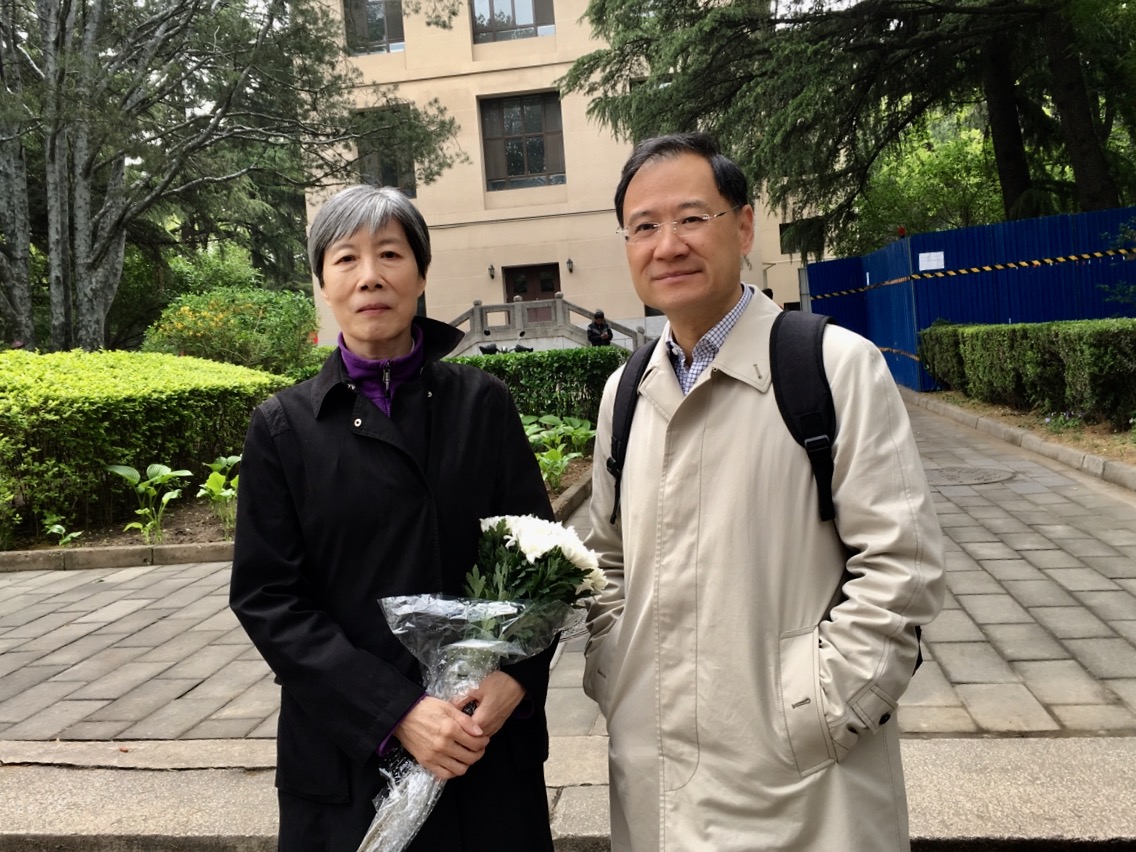Professor Guo Yuhua on the Poison in China's System (original) (raw)
Guo Yuhua (郭於華, 1956-) is a prominent scholar in the Sociology Department of Tsinghua University. She was one of the first people to speak out in protest against the overt official persecution of her colleague Xu Zhangrun 許章潤, a professor of law at Tsinghua, from March 2019. In her essay, translated as ‘J’accuse, Tsinghua University!’ (China Heritage, 27 March 2019), she wrote:
… you can be as mediocre as you want, you can even be guilty of mistakes: but you cannot and should not do evil! I appeal to you to be respectful of basic morality and ‘aim your gun one inch higher’. [A reference to a popular story circulating in China related to the trial of a soldier who was accused of murder following the fall of the Berlin Wall. The soldier said that he had only shot people climbing the wall because he had been ordered to do so. The lawyer asked: ‘Couldn’t you simply have aimed one inch higher?]
Now with the gun aimed at everyone who dares to speak out during the coronavirus epidemic since December 2019, Guo Yuhua refuses to be silenced.
***
In the following interview, conducted by Radio Free Asia and published on 3 March 2020, Guo Yuhua addresses the coronavirus epidemic in the context of China’s systemic limitations. She addresses her comments to the fundamental question of intrinsic human worth and the value of the individual, a perennial issue throughout modern Chinese history. In fact, these have been topics of concern to China’s Communists, and their opponents, since the Yan’an Rectification Campaign of the early 1940s (see ‘Ruling The Rivers & Mountains’, China Heritage, 8 August 2018) and were again taken up by Mao and his theoreticians in the early 1950s. The question of humanism and human value, and concomitant issues like human rights, were also a focus of the Anti-Spiritual Pollution Campaign of 1983-1984 (see ‘Spiritual Pollution Thirty Years On’, The China Story, 17 November 2013), and a prelude to the crushing of the mass protests of 1989. The Communist Party’s view of human worth, particularly its usefulness in achieving and maintaining political power, has been consistently, and narrowly, utilitarian and inhumane, as well as anti-humanist. As Guo Yuhua forcefully points out below, it remains so to this day.
— Geremie R. Barmé
Editor, China Heritage
6 March 2020
***
Further Reading:
- Guo Yuhua, ‘Original Intentions Start with the People [8 December 2017]’, trans. David Ownby, Reading the China Dream
- ‘Guo Yuhua: China’s Suffering Class’, China Channel, 15 March 2020
***
- Ian Johnson, ‘Ruling Through Ritual’: An Interview with Guo Yuhua, New York Review of Books, 18 June 2018
- Xu Zhangrun and Guo Yuhua speak to Voice of America 美國之音 about ‘The Death of the Tsinghua Spirit’, YouTube, 29 April 2019
- Various Hands, ‘Anniversaries New & Old in 2019 — Remembering 5.4, Accounting for 4.28’, China Heritage, 4 May 2019
- Geremie R. Barmé, ‘Spiritual Pollution Thirty Years On’, The China Story, 17 November 2013
- Xu Zhangrun, ‘Viral Alarm: When Fury Overcomes Fear’, trans. Geremie R. Barmé, ChinaFile, 10 February 2020
- ‘2019-nCoV — A Teaching Moment, Spring Term 2020’, China Heritage, 12 February 2020
- William H. Overholt, ‘After the coronavirus, can Chinese politics ever be the same?’, The Inside Story, 21 February 2020
- Xu Zhiyong, ‘Dear Chairman Xi, It’s Time for You to Go’, trans. Geremie R. Barmé, ChinaFile, 26 February 2020
- Geremie R. Barmé, ‘China’s Coronavirus Crisis Is Just Beginning — Xi Jinping’s handling of the epidemic is reviving political dissent’, The New York Times, 3 March 2020 (Chinese version: ‘中国的疫情危机才刚刚开始’, 4 March 2020)
- Stephen Lee Meyers, ‘China Pushes Back as Coronavirus Crisis Damages Its Image’, The New York Times, 6 March 2020
- Michelle Goldberg, ‘Trump’s Calamitous Coronavirus Response’, The New York Times, 6 March 2020
The ultimate concern of China’s polity today and that of its highest leader is to preserve at all costs the privileged position of the Communist Party and to maintain ruthlessly its hold on power. What they dub “The Broad Masses of People” are nothing more than a taxable unit, a value-bearing cipher in a metrics-based system of social management that is geared towards stability maintenance. “The People” is a rubric that describes the price everyone has to pay to prop up the existing system. We are funding the countless locusts—large and small—whose survival is supported by a totalitarian system.
保家業、坐江山,構成了這一政體及其層峰思維的核心,開口閉口的「人民群眾」不過是搜刮的稅收單位,數目字管理下的維穩對象和「必要代價」,供養著維續這個極權政體的大小無數蝗蟲。
— Xu Zhangrun, ‘Viral Alarm: When Fury Overcomes Fear’,
trans. G.R. Barmé, ChinaFile, 10 February 2020
***

Professor Guo Yuhua
***
The Political Manipulation of People is
More Toxic Than Any Virus
專訪郭於華:把人當工具的統治方式比病毒更可怕
Guo Yuhua 郭於華 Interviewed by
Zheng Chongsheng 鄭崇生 of Radio Free Asia
Translated by Geremie R. Barmé
A topic of heated discussion on Chinese-language social media was sparked by a report on Monday about how a number of medical professionals, chief among them being Zhong Nanshan, the nation’s most famous epidemiologist, had demonstrated their loyalty by taking the oath to be ‘fast-tracked’ into the Communist Party [called ‘火線入黨’, literally ‘fire-wired Party induction’; see Xinhua News Agency, ‘鐘南山領誓 火線入黨’].
In an interview with Radio Free Asia, Professor Guo Yuhua of the Sociology Department of Tsinghua University cuts to the quick: ‘The political manipulation of people is more toxic than any virus’. This observation was made during a conversation between Professor Guo and our reporter Zheng Chongsheng.
這兩天,中國官方抗疫的代表人物、中國工程院院士鐘南山週一率領新入黨的醫護人員宣誓效忠的視頻在社交媒體熱傳。清華大學社會學系教授郭於華接受自由亞洲電台專訪時直言,「把人當工具的統治方式,比病毒更毒」。接下來請聽記者鄭崇生和郭於華的對話。
***
Radio Free Asia: How should we regard those people who claim that even as insiders of the system they still try to speak out, as is the case with Zhong Nanshan?
問:我們該如何評價試圖留在體制內發聲的人,例如鐘南山先生?
Guo Yuhua: The space for professionals to speak out within the system as it presently exists is extremely limited. The constraints imposed exist to prevent people from telling the truth; the pressure people are under is tremendous. Having said that, I find it incomprehensible that anyone would actually want to join the Communist Party. Do they reason with themselves that they won’t be able to speak out unless they are in the Party? Can’t you express your professional opinion as an individual? I simply don’t get it. Frankly, I’m dumbfounded.
答:在這個體制內的專業人士,能說話的空間非常有限,就是這個體制逼得所有人不能說真話,壓力確實很大。但是,我也同樣很不能理解,我覺得,你不入那個黨,你就不能說話嗎?就不能用專業的方式說話嗎?我也不能理解、百思不得其解。
Q: Do you think what the people of China really need right now, a moment dubbed [by the propagandists] a ‘Whole-of-Nation War on the Epidemic’, is for prominent medical professionals led by Zhong Nanshan to swear allegiance to the Communist Party?
問:讓鐘南山這樣的專業人士率眾入黨宣示,是「大國戰疫」此時此刻,中國人民需要的嗎?
A: Of course, there’s no need; in fact, it will have the opposite of the desired effect or, worse, it might aid and abet [the Party’s] efforts to hide the truth. You [that is the party-state] employ all the means at your disposal to impose a politics of ‘Great Unity’ [大一統, an ancient term implying politically imposed homogeneity] in every sphere, but in reality you can’t manage to do it. You want to frustrate the attempts of civilian actors to volunteer independent support [to those dealing with the epidemic] while pursuing your unified command-and-control approach to the situation, but you simply cannot control everything so you end up exacerbating what is already a man-made disaster. That’s why we can observe that this kind of system and the way it thinks about the world as a whole is based on an approach that regards people as nothing more than utilitarian objects [or political tools; that is, as merely the means to an end], something to be subjected to management and control. Such a thing is in and of itself a kind of virus; it’s a governance system that is no less deadly than the coronavirus itself. Personally, I think it’s even more toxic.
答:我不覺得需要,我覺得,這都是起「反作用」的,甚至,在某種程度上,你掩蓋真相。你用這種「大一統」的方式,做一切事情,但事實上,你又做不到。一方面你還在限制社會力量的援助救助,你想要統領一切,你又沒辦法管好一切,人為製造更多災難。所以,從一定程度上講,這一種體制和想法,把人作為工具來對待、作為統治對象,這種東西本身就是病毒,這種統治,不比新冠肺炎的病毒毒性小,我覺得,毒性甚至更大。」
***

‘Renowned Chinese respiratory specialist Zhong Nanshan (centre) attends an oath-taking ceremony via video connection … to join the Communist Party of China, in Guangzhou, south China’s Guangdong Province, March 2, 2020.’ Source: Xinhua News Agency
***
Treating People Like Mere Tools
Creates Society-wide Tensions
掌權者視人如工具
導致中國各種關係緊張
Q: Even before the outbreak of the coronavirus, the doctor-patient relationship in China was tense. Can you tell us why that was the case? How do you think the situation will change as a result of this epidemic?
問:在新冠肺炎疫情之前,中國醫患關係緊張的原因何在?這次疫情又會給醫患關係造成什麼影響?
A: In my opinion, in the final analysis, all of China’s problems have to do with a political system that simply does not treat people as human beings [that is, with basic, inherent rights]. That’s the backdrop to everything; it’s what is behind the systemic problems in the medical industry as well; fundamentally, it’s not about the ethical standards or competence of the medical professionals.
Now that you [the state] need them [medical professionals] they are celebrated as ‘heroes’ and ‘angels’, but after this epidemic has passed, just as was the case with the SARS outbreak, will you do anything to compensate them? Do you have a proper plan? Then, when another problem arises, again you’ll expect them to clean up your mess and you’ll treat them as nothing more than cannon fodder.
But that’s not just true of medicos, in China the power holders regard everyone, including academics and teachers like me, as nothing more than pliant tools. We are simply not thought of as individual human beings.
What are human beings? They have natural rights; they are free. Why should I sacrifice myself for you? That’s right — we shouldn’t forget that the state, your state, exists to serve its citizens and the public. We the people are not supposed to be your servants. We are the ones paying for you, and you should be working on our behalf. But the fact of the matter is that the exact opposite is true.
答:我覺得,中國基本上所有問題,都集中到這個權力究竟把不把人當人看。這個背後的問題,是整個醫療體制的問題,並不是醫護人員的道德或醫療水平問題。
你用他們(醫護人員)的時候,就說他們是英雄、是天使,但疫情災難、就像非典過去以後,這些人得到什麼補償?有很好的安置了嗎?出現問題後,你還要他們頂包、要他們當炮灰。
其實,不光是醫護,我覺得,在中國,所有人,包括我們學者和教師,在這個權力眼裡,都是工具,我們都沒有被當作人。
什麼是人?人是有天賦權利的,是有自由的,不是說我都要為你奉獻,我憑什麼要為你奉獻啊?對吧!你國家本來就應該是要為公民和公眾服務的,不是我們人民為你服務,是我們把你養著、你來為我們服務的,現在關係整個就顛倒了。
Q: Don’t they all say [mouthing a famous line from Mao] ‘Serve the People’?
問:不是都說要為人民服務嗎?
A: Of course, and doesn’t it sound good. In practice that’s not the case at all!
答:對,話說的好聽,做起來就不是那麼回事兒!
***

‘Serve the People’, in the calligraphic hand of Mao Zedong
***
Technology Aids and Abets Totalitarian Rule
Guo Yuhua Sees No Hope for Reform
科技讓極權統治更純熟 郭於華對改革絕望
Q: If the people are truly awakened [to the situation] might they not pressure the system to reform itself? Are you still hopeful?
問:人民覺醒,有可能促成體制改革嗎?您還懷抱希望嗎?
A: I’ve never entertained such hopes. Now I’m even less hopeful than ever. Think about it: in the first place, we are talking about [the party-state enjoying] unfettered power; they can do whatever they please, involve themselves in any and everything that they might wish to. They can interfere with the workings of the market, with the activities of professionals, with education. They can interfere in absolutely everything. But, when problems arise, do they ever accept any responsibility? Of course they don’t take the blame.
Given that the system is so powerful that it can maintain a tight rein on absolutely everything while never feeling constrained to accept responsibility for any of its mistakes, do you think I am hopeful that it might suddenly become motivated to reform itself? It doesn’t want to give up anything and it will never relinquish power. This is what we have: an extreme version of a 360-degree autocracy.
Moreover, today it has everything on its side, including the latest in high-tech ways and means. This equips it to do things far beyond anything anyone outside the system might be able to imagine. That’s why I’m both furious and desperate — I simply can’t see any way out whatsoever!
答:我從來就沒抱過希望,現在,我當然就更不抱希望。你想一想吧!首先,一個權力不受任何限制,他想幹什麼就幹什麼,想到哪伸手就到哪伸手,他可以去干擾市場、專業、教育,他什麼都可以伸手,但是出了問題,他承擔責任嗎?他什麼責任也不承擔啊。
那你可以想像,一個權力強大到如此程度,什麼都抓在手裡,而出了問題,他任何責任都不承擔,他哪來的改革動力啊?他才不願意放棄,他永遠都不放棄這個權力,這就是極端的、全方位的權力, Authoritarianism(集權的統治)。
而且,今天他什麼都不缺,他還有高科技的手段,可以達到體制外的人難以想像的程度。所以,我真的就是很生氣,也很絕望的狀態,你不知道出路在哪!
This, then, is the nub of all of China’s problems. The present coronavirus crisis has revealed the true nature of the system from inside and out. The other day, I made an observation in a WeChat group that if, even after all that has happened, people still refuse to see what’s really going on then they’re simply ‘incurable’.
其實,中國所有的問題,都在這。只不過,這次新冠肺炎的疫情,把中國權力的這種樣子樣貌,從表面到內在的本質,都顯露出來了。我那天還在微信上說一句,如果這個事件,到現在還有人看不明白的話,就「無藥可救」了。
***

Professor Guo Yuhua (left) and Professor Xu Zhangrun, preparing to pay their respects at the Wang Guowei Commemorative Stele, Tsinghua University, 28 April 2018
***
Eighty WeChat Accounts Blocked
Guo Yuhua Remains Fearless as
She Speaks Out on Behalf of Xu Zhangrun
先後被封八十個微博帳號
郭於華無懼為許章潤抱不平
_Q: After Xu Zhangrun, your colleague and a professor in the law faculty of Tsinghua, spoke out [on 4 February, see_ ‘Viral Alarm: When Fury Overcomes Fear’], he was shut down again. Have you been in contact with him recently? What’s his situation?
問:您的同事、清華大學法學院教授許章潤說話之後,又被禁言了。您最近有和他聯繫嗎?他近況如何?
A: He was barred from teaching [in late 2018] and his professional life — work, taking on research scholars — has been completely destroyed, and that includes his research work. [For details, see ‘Xu Zhangrun vs. Tsinghua University’ in the Xu Zhangrun Archive on this site.] The way he has been treated is absolutely absurd. All he did was write an essay! [See Xu Zhangrun, ‘Imminent Fears, Immediate Hopes — a Beijing Jeremiad’ 我們當下的恐懼與期待, July 2018.] It was not that different from saying a bit too much and it was just an essay, for heaven’s sake. What’s the big deal about someone simply expressing their personal opinion? Or, if you want to think about it from a more professional or legalistic framework: you tell me, according to what particular law do you have the right to persecute this man?
答:他一直都停課呢,工作、招生,通通都受影響,也停止科研工作。這些做法都特別荒謬。他不就寫了一篇文章嗎?這跟多說幾句話有什麼區別啊,寫篇文章,表達自己看法,有什麼不行?而且,人家是從專業學者角度去看事情,你憑哪一條法律,去制裁人家啊?
Q: Doesn’t China have a legal system?
問:中國不是法治國家嗎?
A: China is ‘ruled by laws’ 以法治國, it doesn’t, however, enjoy ‘the rule of law’ 依法治國.
From the time of the Magna Carta, even the British monarch was subject to the law. In a modern country [like China] by all rights political power itself should also be subject to the law; the Communist Party should also be beholden to the law. But here it’s different: they are above the law! The law is a tool used to maintain their preeminence and it is deployed to punish the common people. So they do indeed ‘rule by laws’, that is, they employ the law to rule over you. What do you call that?!
Then [over recent weeks, there are those individuals [like Chen Qiushi 陳秋實, Fang Bin 方斌, Li Zehua 李澤華, etcetera] who went to the quarantined zone [of Wuhan] to investigate the on-the-ground situation for themselves. One after another they have all disappeared. What law exactly allows you to refuse a citizen the right to carry out their own investigation? So what if they are reporting independently. Exactly what law forbids that? They’ve all been disappeared and their families have had no news of their whereabouts. What kind of crazy situation is this? The authorities are breaking the law and contravening the constitution!
答:中國就是Rule by law、以法治國,不是rule of law、依法治國。
因為,從英國大憲章開始,就是王在法下。作為一個現代國家,你應該權也必須在法下,你的黨也必須在法下。結果,現在變他們全在法上啊!法就變成他們統治與制裁老百姓的工具啊!他們就是Rule by law,他們拿法律來治你,這叫什麼呀!
然後,那些個人,作為公民到疫區調查,一個一個都被失蹤。你憑哪一條法律規定公民不可以去調查呢?那怕是個人的報導,你拿得出一條法律來說嗎?這些人就都失蹤了,家人也不讓聯繫,你這叫什麼啊?你這才叫犯罪和違法呢!
Q: Given the case of Xu Zhangrun, and what has befallen him, by speaking out like this aren’t you afraid for yourself?
問:有許章潤老師的例子與遭遇,你這樣講話不會害怕嗎?
A: Of course I’m scared! Who wouldn’t be? However, no matter how scared you might be, you can’t let yourself kneel before them, nor can you allow yourself to fall. No matter how scared you might be, you just have to keep standing upright. For me, there’s simply no other choice. Forget all of that stuff about me being a scholar, a professor and a public intellectual. I’m an individual, a normal person, plain and simple, and I want to live like one.
I live in China and I am willing to speak out here. Since they have shut down every other avenue available to me to speak out, I’ll cast aside all concerns. I’ll use whatever means are available to me to make myself heard.
答:我害怕啊!沒有人會不害怕的。但是,你害怕,也不能跪下、倒下,你害怕也還是得站著。我覺得,應該沒有什麼路可退了,我就不說什麼我是學者、教授、公共知識分子,我哪怕就是個人、像個普通人,我得像個人樣吧!
我是願意在國內發出聲音的,但既然你們把我一切發聲的渠道都封死的話,那好吧,我也就不管了,我只要有一個渠道,我就要說。
Interviewer: Zheng Chongsheng
Editor: Shen Hua
Online editor: Hong Wei
記者:鄭崇生
責編:申鏵
網編:洪偉
***
Source:
- 鄭崇生, ‘專訪郭於華:把人當工具的統治方式比病毒更可怕’, 《自由亞洲電台》, 2020年3月3日